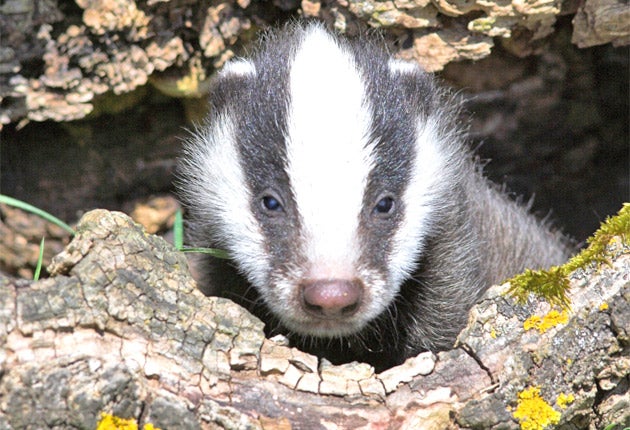Government reverses Labour policy with plan for badger cull
Activists claim animal's future is being sacrificed for political points

The saga of badgers and tuberculosis in cattle returned to the centre stage of politics yesterday as the Government unveiled proposals to allow farmers to cull badgers in TB hotspots – a complete reversal of the previous government's policy.
The announcement from the Conservative Agriculture Minister, Jim Paice, delighted the farming community but left animal welfare and wildlife groups expressing dismay. It foreshadows a serious struggle, with determined challenges expected to the culling policy in the courts, and perhaps through direct action in the countryside.
The coalition Government believes that killing badgers on a large scale is the only solution to the problem of the animals carrying tuberculosis and infecting cattle herds. Bovine TB is now costing £63m a year in England alone, largely in compensation for the 25,000 infected cattle that are being slaughtered annually.
Mr Paice said the disease was causing "immense trauma" to the farming community. "We can't go on like this," he said. "It's clear the current approach has failed to stop the spread of this terrible disease. We need to take urgent action to halt its spread."
While the causal link between badgers and bovine TB is widely accepted, scientists disagree on the efficacy of a cull in controlling it.
After a nine-year trial which ended in 2007, researchers said it was not a feasible solution, as culling would be too expensive and could actually increase the incidence of the disease – when survivors of a disturbed, partly-culled group of badgers wandered about the countryside, spreading TB as they went, a phenomenon known as "perturbation".
On the basis of this advice, the previous Environment Secretary, Hilary Benn, ruled out a cull. Yesterday Mr Paice, himself a farmer, overturned Mr Benn's policy, describing it as "a mistake". Mr Benn hit back directly, saying Mr Paice was making the "wrong decision".
He added: "Badger culling has already been tried. It would be neither practical nor publicly acceptable, and getting it wrong could actually make matters worse. Shooting badgers may make ministers feel that they are doing something, but it is not the way to beat this disease."
The political charge that the issue carries was emphasised by the fact that the Liberal Democrat half of the coalition remained lukewarm about the announcement. Andrew George MP, the Liberal Democrat agriculture spokesman, who is not a member of the Government, said: "The largest wildlife experiment by Government recently concluded that licensing farmers to cull badgers 'would entail a substantial risk of increasing the incidence of cattle TB and spreading the disease'.
"Bovine TB is a massive challenge for Government and the farming community. We must make sure that we don't succumb to pressure only to make matters worse."
But the Government feels that something has changed, and officials said the most recent research showed that the perturbation phenomenon tailed off quite quickly, while the benefits of a cull continued for several years.
The other objection, that culling would be too expensive, is being solved in a bluntly simple manner – farmers will have to pay for it themselves.
Under the proposals, set out in a public consultation exercise which ends in December, groups of farmers in areas of heavy TB infestation would be allowed to apply for licences to cull badgers by cage-trapping and shooting them, or – a much cheaper option – by "free shooting" as animals emerge from their setts in the evening.
Farmers will also be allowed to use the new badger TB vaccine, which has been approved for use only this year, but the Government has rejected a vaccination-only policy as it believes it would be too slow, with the animals having to be caught and then injected. An easily-distributable oral vaccine is thought to be five or six years away at least.
The RSPCA said yesterday that it remained strongly opposed to any cull of badgers on the basis of the science and the practicality and animal welfare implications of such a scheme.
The Wildlife Trusts – whose logo incorporates a badger – said TB was a significant problem without a single solution, adding: "We are concerned the scientific evidence does not support the culling of badgers as part of that solution."
The badger threat
* Britain's badger population is estimated at 250,000 to 300,000.
* Cases of TB in cattle cost the UK more than £100m in 2009.
* From 2008 to 2009 the number of cattle slaughtered as a result of bovine TB rose by a third.
* The disease is particularly prevalent in the west of England, between Shropshire and Cornwall.
* According to the Department for Environment, Food and Rural Affairs, in Devon in January and February this year more than 1,000 cattle with TB were slaughtered.
* The number of new bovine TB incidents discovered between January and May this year is estimated to have fallen 5.5 per cent.
* The Kerbs experiment (also known as the Randomised Badger Culling Trial), which marked out large areas of the countryside, killed 11,000 badgers in its attempt to investigate the efficacy of culling as a control strategy.
* According to the Badger Trust, Scotland is TB-free without any action against badgers.
* One millilitre of badger urine contains up to 300,000 bacteria.
Join our commenting forum
Join thought-provoking conversations, follow other Independent readers and see their replies
Comments
Bookmark popover
Removed from bookmarks